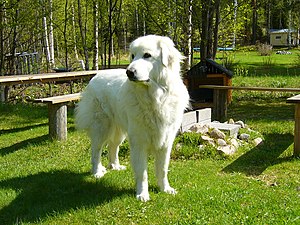In case you are wondering, I did not mean to repeat my opening paragraph on the last post -- it just happened. I've been trying to edit it out, but every time I delete it, the entire post goes. I've given up on it.
The funny thing about this is that, based on the above paragraph, Zemanta has just supplied me with photographs and articles that are related to funeral homes and the U.S. government -- I don't see the connection, myself. A few relevant things are mixed in, so I'm putting them below.
Tuesday, November 23, 2010
Sunday, November 21, 2010
You'll be thankful you thought ahead

Image via Wikipedia
This may seem like a strange time to talk about it, but as your dog gets older you need to think about end-of-life issues, just as you would for a human. I'm thinking about this just now because the older of my sister's two Great Pyrenees turned 13 this month, which is very old indeed for that breed. Gus is still pretty active and alert, but he has developed some weakness in his hind legs, as well as incontinence. Since I was thinking about how Tony died soon after last Thanksgiving (he had turned 13 early in November, 2009), I mentioned to my brother in law that it might be a good idea to start thinking about the inevitable. Steve tends to think in do-it-yourself terms (partly from personality, and partly because he hates to pay), and he told me his expectations (although not in so many words): 1. Gus would die at home, and 2. he would bury him.
It seems to me that these are common expectations in our culture, but nowadays they are unrealistic. Unless your dog, or any other pet, for that matter, dies in his or her sleep, you will probably do as I did, which is rush it to the vet because it is in distress of some kind. You will be very upset and faced with several decisions that you are in no shape to make on the spot: BUT THEY HAVE TO BE MADE RIGHT THEN. It is much better to decide ahead of time how far you are willing to go in your efforts to save your pet (if that is at all possible or wise) because when the time is at hand, you could be in a state where you will do anything to prolong his or her life, regardless of any financial hardship or common sense.
I am thankful that my veterinarian managed to keep me from grasping at straws in that regard. I thought that I was prepared, and I was, in some ways, but I had no idea how hard it would hit me emotionally. I had already decided that when the time came I would have him cremated privately (see the article "When is the right time . . ." below for information about cremation) so that I would get his ashes, and I had a vague idea of how much that would cost. It never occurred to me to bury him at home; I'm disabled, and our water comes from a well (I don't know for sure if that matters, but I wouldn't take a chance). It turns out that there may also be legal issues involved with a home burial. Steve wouldn't like hearing that.
Burying -- at home -- a dog the size of Gus, who is small for a Pyr, but more than 10 times the size of a Pomeranian like Tony, just doesn't make sense. I think Steve sees that now; he's actually done some research into the alternatives, not that he's happy thinking about this problem in any way. But I know he will be glad he did.
In the meantime, I'm doing my part to help keep Gus happy and as healthy as possible.
Related articles
- When is the right time to say goodbye to an ailing pet? (mnn.com)
- Urns for Your Pet Dog (brighthub.com)
- When Knitting Goes To The Dogs (timesunion.com)
- Memorable Pet Remains - Alex Lynch's Pet Cremation Tablets Let You Remember Your Furry Friend (GALLERY) (trendhunter.com)
- Squash my Dog Fears and other Pumpkin Thoughts [Casaubon's Book] (scienceblogs.com)
- What Are The Top 10 Biggest Dog Breeds? (brighthub.com)
- Rescuing the guardians (timesunion.com)
- Dog who saved soldiers euthanized by mistake (ctv.ca)
Subscribe to:
Posts (Atom)








